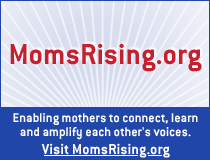Happy Mother's Day, Really?
By Kristin Rowe-Finkbeiner
With Mother's Day today and more than 21,000 floral shops busy sending bouquets in honor of the occasion, most would agree that our nation generally supports "mom and apple pie," but the question, "Does our country do more than pay lip service to the important role of mothers?" becomes more and more pressing each day as the economy tightens and families struggle to keep up.
Turns out that too many modern mothers are suffering from "Invisible Woman" syndrome. That's a big part of why a quarter of U.S. families with children under six is living in poverty, and why women are still struggling to break the glass ceiling and, in many cases, to even get past the Maternal Wall to get in the room (Last I checked there were only 13 female CEOs of Fortune 500 companies).
Here's what that invisibility looks like: Diane, a mother of three, was standing in the prep room of the Wal-Mart deli where she worked in Florida. She and two other women who worked together at the deli were getting ready for the day, taking food out of the freezer, opening packages of meat, and putting together food trays.
A young man about eighteen years old, a new hire, walked through the double swinging doors from the warehouse muttering complaints under his breath. Diane recalls, "He was saying, 'They want me to do this, and they want me to do that, all for this small amount of money. And then he said his pay.' We were all like, 'What! That's how much they hired you at!?'" His pay was much higher than theirs even though they had much more experience.
The "Invisible Woman Syndrome" also looks like this: Women without children make 90 cents to a man's dollar, mothers make 73 cents to the dollar, and single mothers make only about 60 cents to a man's dollar. Further, mothers are 79% less likely to be hired than non-mothers with equal resumes and job experiences.
The upshot: modern mothers in the labor force are outright discriminated against in pay and hiring practices. With three in four mothers in the labor force these days, and many families needing two incomes to make ends meet, this isn't something we can afford to keep invisible.
Full-time mothers aren't faring much better. In fact, families with a full-time parent are seven times more likely to be living in poverty than those with both parents in the labor force.
Its 2008, so why are things still this way? One reason is that our nation still has its head in the sand when it comes to the need of parents and children.
Even in the midst of a presidential election, with women comprising 54 percent of the electorate, candidates aren't paying attention to the issues that matter most to women and families. According to Stan Greenberg, chairman and CEO of Greenberg Quinlan Rosner, which conducted an April 2008 poll of women voters for "Women's Voices, Women Vote Action Fund," "[Women have] gotten more excited about the election, you know, more engaged, but they don't see their issues being addressed. They are looking for pay equity to be addressed. Minimum wage, daycare, education, those are not issues that they've heard the candidates talk about."
Our nation was founded on the notion of equality, and we've struggled for years to attain that, but we're just not there yet. We have a ways to go -- particularly for the 81% of women who have children by the time they are forty-four in our nation.
Solutions to these shared problems aren't far from our fingertips, and they're not too expensive or complex. Countries with family-friendly policies and programs in place -- like paid family leave and subsidized childcare -- don't have the same degree of maternal wage gaps as we do here. Further their governments and economies aren't struggling because they support mothers and families. In fact, many are better off, since family-friendly policies can result in savings through reducing grade repetitions, fewer interactions with the criminal justice system, lower infant mortality rates, and a lower overall need for other government entitlement programs.
We can change our nation for the better and shed our invisibility. Mothers are powerful. There are 82.8 million of us in America, and we vote. And no matter where we're from, we face many of the same hurdles. This year, let's call for candidates for all offices to continue thinking about mothers after the flowers, cards, and perfume from Mother's Day have been sent; and give mothers something they can really use.
***
MomsRising has put together an e-card where you can take action at the end of the animation by sending all the presidential candidates a request to speak to the issues which matter to mothers and families. Join us in stopping the "Invisible Woman" syndrome in its tracks: http://www.momsrising.org/MOTHERsongforyou
 MomsRising.org is an organization working to build a truly family-friendly nation. Started in May, 2006, MomsRising uses the power of online organizing in coordination with grassroots activities and media outreach to educate the public about problems facing American families and to propose common sense solutions. MomsRising.org provides citizens with an opportunity to amplify their voices and to take their concerns to leaders who are in positions to implement real changes. Find us and join us at MomsRising.org.
|
